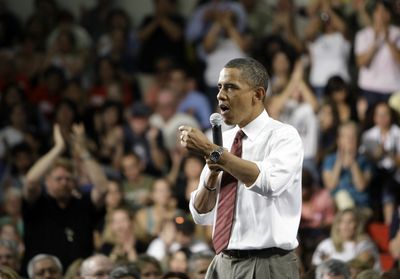Obama may delay announcement
Late this week the best bet for revealing running mate

WASHINGTON – This is Veep Week. That is about all anyone outside Sen. Barack Obama’s inner, inner circle knows – that sometime before next week the presumptive Democratic presidential nominee will announce his running mate. Beyond that, the political world is in a zone of fevered speculation.
Nothing is certain, and one sign of how jittery everyone is about the timing and the choice came Monday afternoon, when the gossipy Drudge Report posted an item that said, “Paper: Obama may announce VP in AM.” That set off alarms in newsrooms across the country until Obama advisers shot it down.
As Obama completed his Hawaiian vacation, there was a widespread assumption, based on nothing solid from the campaign, that he could make his announcement early this week and stage a multi-day rollout. Now, in a twist that goes against recent history, there are signs that Obama may wait to announce his choice until this weekend or just before in hopes of providing a big boost before the convention opens Monday in Denver.
In addition to giving some convention-eve energy to Obama’s campaign, a late-in-the-week rollout would have another benefit in the eyes of Obama loyalists. It could help overshadow the other dominant story heading into Denver, which is the long-running drama over how Sen. Hillary Rodham Clinton and her husband, former President Bill Clinton, and Clinton’s supporters, will handle themselves during the week.
Obama is said to be operating with a list of five finalists, though there is no solid confirmation from his inner circle of who and how many are serious contenders.
One is believed to be Sen. Joseph R. Biden Jr., of Delaware, chairman of the Senate Foreign Relations Committee, who was prepping for the job with a weekend trip overseas to Georgia, at the invitation of President Mikheil Saakashvili, to assess the situation there.
Another presumed finalist is Evan Bayh, a current senator and the former governor of Indiana, one of the red states on Obama’s expand-the-map target list. Bayh is considered a default safe choice and a candidate who, in contrast to Biden, is closer generationally to a candidate who has called for turning the page on the politics of the past. But he generates some hostility among progressives and antiwar Democrats because of his centrist positions on domestic policy and his original support for the Iraq war.
The others? Timothy M. Kaine, the governor of Virginia and the first governor to endorse Obama, appears to be a finalist. It has already been reported that the Obama campaign will be holding a big event in Richmond this week, fueling speculation that Kaine is very, very high on the list.
If anything has hurt Kaine, it may be that the Russian war against Georgia and the resignation of Pakistani President Pervez Musharraf have highlighted the importance of a running mate with national experience and foreign policy credentials.
In his speech to the VFW Monday morning, the presumptive Republican nominee, Sen. John McCain, gave a blistering critique of Obama for opposing the “surge” of troops in Iraq. Obama may conclude he needs an experienced hand and vigorous campaigner to help lead the counterattack on foreign policy between now and November.
The lone woman under consideration may be Kathleen Sebelius, the governor of Kansas. Obama is in a difficult position. He dares not have a final list of candidates that does not include a woman, given Hillary Clinton’s historic campaign and the importance of the women’s vote to his hopes of winning in November. Yet he risks a major backlash among Clinton supporters should he pick a woman other than Clinton.
Clinton, of course, would be the ultimate surprise. Her selection would be a gesture designed to unify and energize the Democratic Party. But given all the questions and concerns about the role Bill Clinton would play during the campaign and particularly in an Obama administration, her selection still appears highly unlikely.